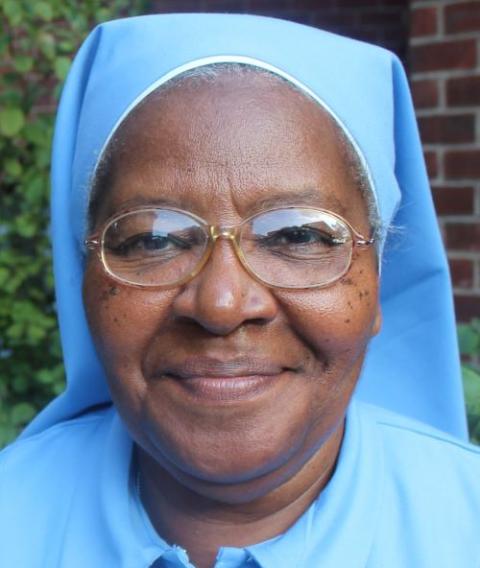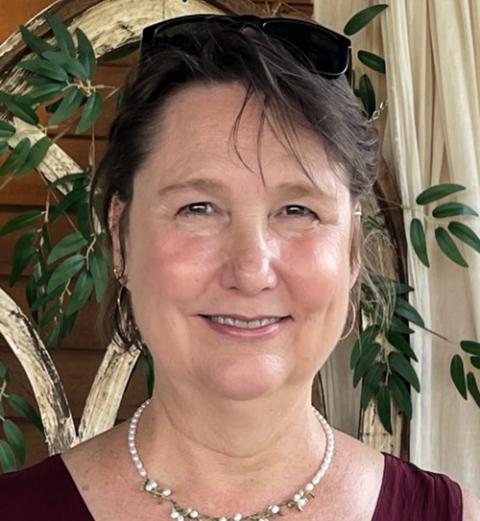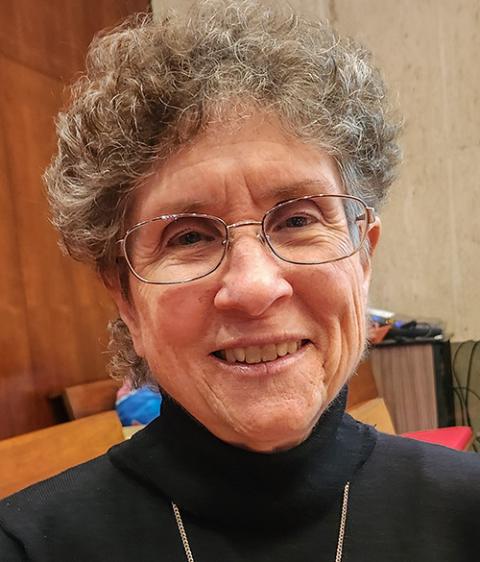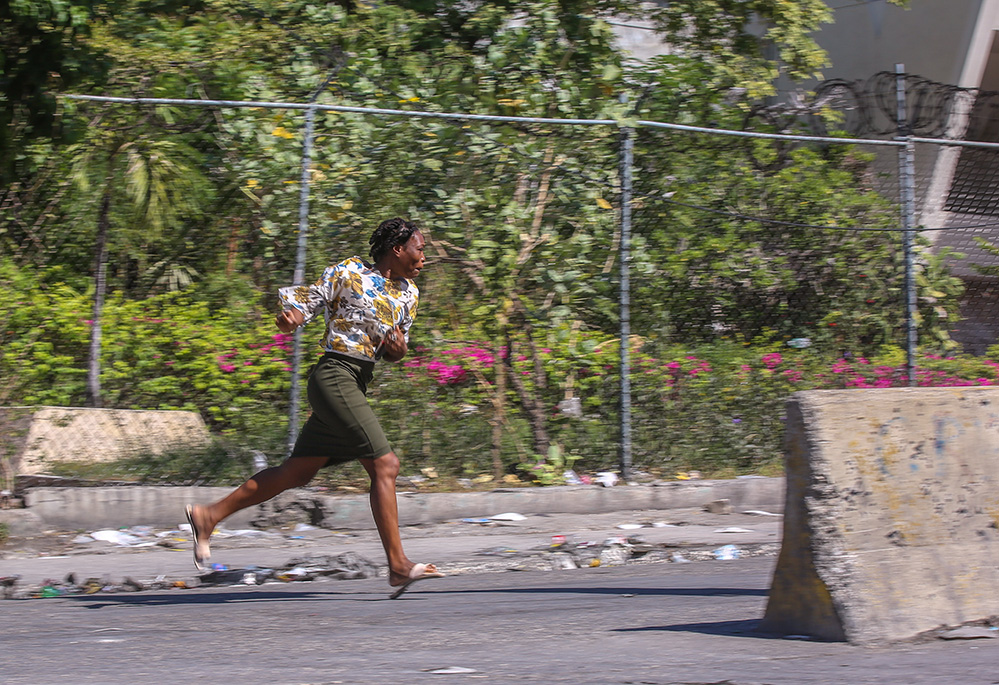
A woman runs to take cover from gunfire during clashes between police and gangs in the Delmas neighborhood of Port-au-Prince, Haiti, Dec. 2, 2024. (AP/Odelyn Joseph)
"We can't move. We're prisoners in the motherhouse."
With that, Sr. Denise Desil, the mother general of the Little Sisters of St. Thérèse of the Child Jesus, summed up one frustration about living now in Haiti — where perhaps as many as 12,000 heavily armed gang members in a country of 12 million have taken control of the roads, streets and highways, threatening communities and committing murders, robberies and rapes.
"We're surrounded by them — these gangs," Desil said of daily life in Rivière-Froide, a suburb about 30 miles southwest of the Haitian capital of Port-au-Prince.
That makes even venturing out for grocery shopping risky. But even worse is the prospect of traveling to the capital.
Sisters have been seen as easy marks for kidnapping and ransom. So on those rare occasions when Desil does travel to Port-au-Prince, she wears what she calls her "civil" wear on the bus.
That saddens her — but not as much as the fact that Desil knows that some of the gang members were once students in schools run by her congregation.
"I feel badly about that, but they don't have anything to do," she said of the gang members — boys, teens and young men — who have no real prospects or alternatives to the gang life. "It's really, really sad."
Such sadness is not likely to abate soon. As 2025 begins, Haiti's problems are persistent and seemingly almost never-ending. That worries advocates — like congregational representatives at the United Nations, such as Annemarie O'Connor — who believe the beleaguered country needs more attention and support from the global community.
"It is all very terrible and constantly worsening," said O'Connor, director of Passionists International at the United Nations.
"Since the gangs block the roads, the cost of fuel goes up, and the price of food goes up, too," said Jean Bony, a Haitian lawyer who works in Haiti as a coordinator for a mission program and partnership with St. Margaret Mary Catholic Church in Winter Park, Florida.
"It becomes very difficult for the majority of the population who are already living in extreme poverty and can't afford many of the important things to live."
Statistics confirm the grim realities. In January, the Geneva-based United Nations Human Rights Office said that at least 5,601 people perished in Haiti in 2024 due to gang violence, an increase of more than 1,000 from the previous year. In addition, some 2,212 people were injured and 1,494 kidnapped in gang-related incidents.
Advertisement
In its Jan. 7 announcement, the U.N. office noted a particularly horrific and shocking act of violence — in early December at least 207 people were slain in a massacre believed to be orchestrated by a powerful gang leader in the Cité Soleil area of Port-au-Prince.
"Many of the victims were older people accused of causing the death of the leader's son through alleged voodoo practices," the human rights officials said. "To erase evidence, gang members mutilated and burned most of the bodies, while other bodies were thrown in the sea."
Meanwhile, a Dec. 17 attack on Bernard Mevs Hospital in Port-au-Prince and the killing of several journalists and a police officer on Christmas Eve at Port-au-Prince's General Hospital prompted condemnation from the U.N.'s designated expert on human rights in Haiti.
Calling the attacks outrageous, William O'Neill said in a Jan. 3 statement that such crimes threaten the access to and provision of health care in Haiti, which he said was already facing near collapse.
"Criminal gangs have murdered and kidnapped physicians, nurses and health care workers, including humanitarian workers," said O'Neill, who often meets with Catholic sisters doing Haiti advocacy work at the United Nations.
Another concern is the particular threat that violence poses to women.
In its report on conflicts to watch this year, the Georgetown Institute for Women, Peace and Security noted that women in Haiti "disproportionately experience — and are even singled out for — killings and sexual abuse amid spiraling gang violence, which risks pushing Haiti closer to state collapse in 2025."
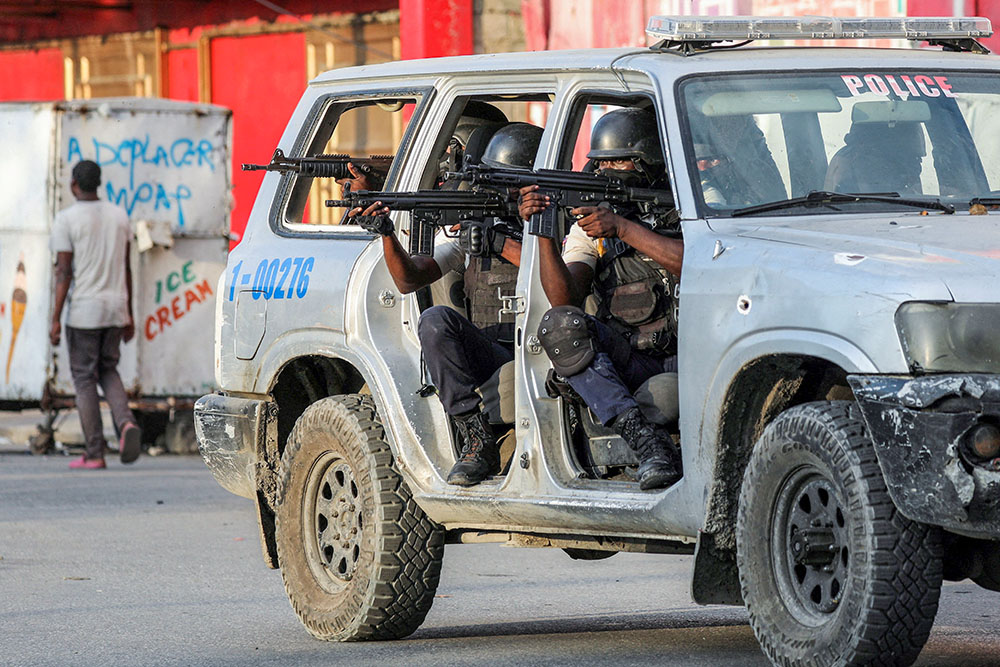
Police officers take part in a confrontation with gangs near the National Palace in Port-au-Prince, Haiti, March 21, 2024. (OSV News/Reuters/Ralph Tedy Erol)
The collapse of most state institutions and political leaders' dependence on gangs are often cited as two reasons for the gangs' increased control over much of the country.
The gangs' power increased after the July 2021 assassination of Jovenel Moïse, Haiti's 43rd president, which left a political power vacuum — though the Caribbean country's history was long marred by impunity and human rights abuses at the hands of government forces.
Gangs now everywhere in Haiti
Mercy Sr. Marilyn Lacey, who has managed projects in Haiti for more than a decade, has been watching events unfold in recent months with a wary eye and a heavy heart.
She notes that while news like the massacres might get some attention in the United States, the day-to-day realities of life in Haiti remain largely hidden to the international media, with massacres now happening throughout the country, and not just Port-au-Prince. "The gangs are now everywhere. They have spread out."
"What happens is the poor are living in the slum areas of Port-au-Prince, and the gangs control different sections of those slums," Lacey told GSR in an interview. "And so it's all retribution between the gangs, and the innocent people are caught in the middle and killed."
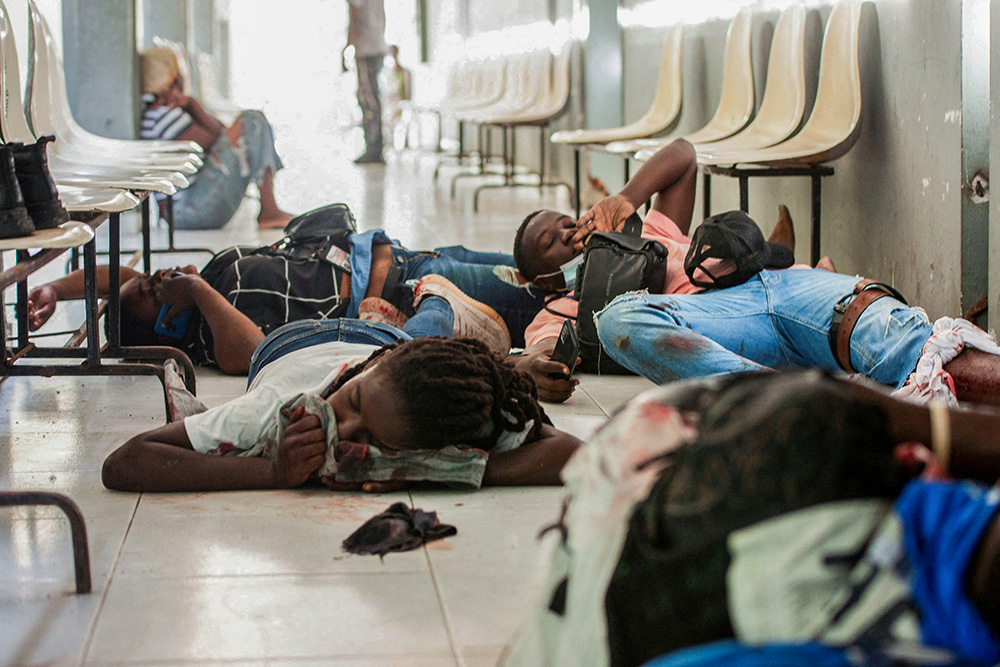
Injured people lie on the ground after armed men opened fire on a group of journalists who gathered for a government press conference set to announce the reopening of the General Hospital in Port-au-Prince, Haiti, Dec. 24, 2024. (Reuters/Fildor Pq Egeder/File Photo)
She said the Christmas Eve massacre at the General Hospital was almost inexplicable. That hospital had been closed and journalists were there to cover a joyous event — the facility's reopening.
"So somebody didn't want that to happen and just started killing people."
The situation in Haiti now "looks very intractable," she said.
Lacey, who is based in California, spoke recently by a phone to a Haitian woman and asked how she was coping in the midst of turmoil and violence.
"She said, 'Well, we are OK, sister, thank you for asking. But we're very aware that the gangs can strike anywhere in Haiti.' So how do you live with that?"
"It's that unsettledness of 'When will it happen next?' that is so disturbing," Lacey said, adding that pervasive violence is now everywhere.
Lacey said that the gangs have no trouble recruiting young people, "because if you're half starved, poorly clothed and wearing broken flip-flops and you have no chance of a job, it's pretty hard to resist joining a group like that and if you do refuse you might become a target of the gang that is trying to recruit you."
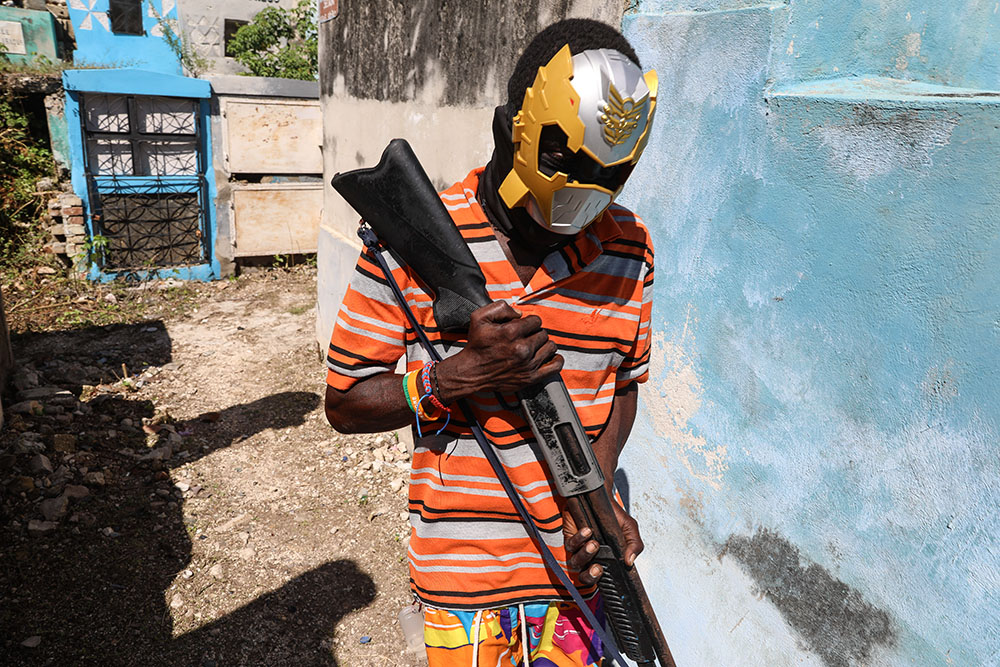
A masked, armed gang member poses for a photo at the National Cemetery during the Fete Gede festival celebrating Day of the Dead in Port-au-Prince, Haiti, Nov. 1, 2024. (AP/Odelyn Joseph)
"A member of a gang gives you power, resources and a modicum of safety," Lacey said. "It's a desperate situation, even for those who don't want to be in gangs. And if you stand up against the gangs, then you are the next victim."
The violence has become so ubiquitous that mass killings now seem commonplace.
Kim Lamberty, the executive director of the Washington-based Quixote Center, noted that the city of Gros-Morne in northern Haiti was attacked on Jan. 18, with at least 11 people killed and numerous houses burned.
While none of the U.S. group's Haitian partners were directly affected, the escalating violence outside of Port-au-Prince is being keenly felt. "All are impacted," Lamberty said. "Everyone is scared."
This is possible, of course, because of the proliferation of guns and ammunition, an issue of increasing concern for advocates concerned about Haiti.
More than 20 sister congregations and sister-led coalitions in the United States are collaborating on efforts seeking federal action to curb the flow of guns and ammunition into Haiti.
A public action on Capitol Hill in September attempted to draw attention to the problem, with organizers saying that the worsening situation has "been made possible by the illegal import of arms from neighboring countries, with an estimated 70% originating in the United States."
"People can't live in Haiti safely, and the weapons are coming from the United States, and we're allowing it to happen. And we have got to address that," Lamberty said.
Given immigration concerns with the Trump administration and President Donald Trump's past derogatory comments about Haitian immigrants, this is a moment, Lamberty said, in which "it's crucial to make the connection between migration and gun trafficking," as well as endemic, structural poverty in Haiti.
Americans need to understand, she said, "that people from Haiti and other parts of the world are not migrating to the United States to steal our jobs and destroy our country. People are migrating to the U.S. because they can't live in their own countries safely."
Dawn Colapietro, a lay missionary with the Sisters of Charity of St. Elizabeth, New Jersey, agreed, saying that confronting violence in Haiti is paramount right now.
"Stopping the gun trafficking, stopping the violence," she said, "has to be the core issue before you can even begin to talk about economic and political stability."
Colapietro added: "Every day the gangs get a little bit more territory, the gangs get a little bit more violent, and people become a little bit more hopeless. And that trend has been happening now for a very long time, and spiraling towards that end with nothing.
"It's like a snowball going down a hill. There's nothing to stop it."
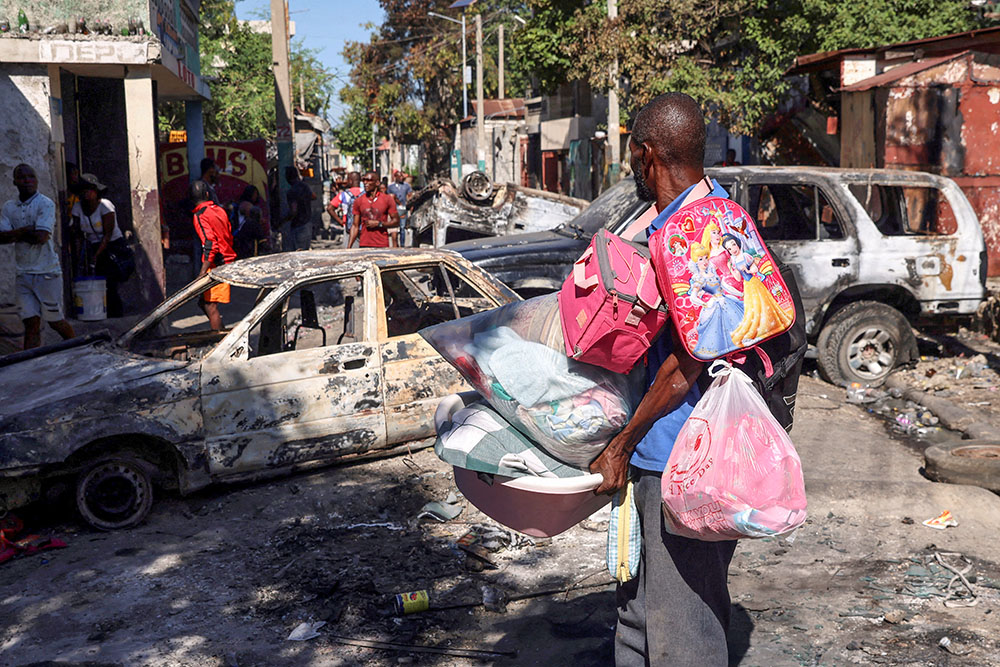
A man carrying his belongings observes the wreckage of vehicles burned by armed gangs as he flees the Poste Marchand suburb in Port-au-Prince, Haiti, Dec. 9, 2024. (OSV News/Reuters/Ralph Tedy Erol)
Lacey believes that one hopeful step would be securing the country's roads — easing travel and helping improve daily life. Yet that prospect seems distant — any immediate solutions appear daunting.
In 2023, the United Nations Security Council approved a small Kenya-led Multinational Security Support Mission in Haiti. But expanding and converting that into a U.N. peacekeeping mission faces opposition in the U.N. Security Council from China and Russia, and "insufficient support for stabilizing efforts will continue to jeopardize women's safety this year," the Georgetown Institute for Women, Peace and Security noted.
Late last month, U.N. Secretary-General António Guterres warned that the Kenya-led forces — in Haiti to support Haitian police — required more international support. Without more funding for that operation, Port-au-Prince faced the threat of being fully overrun by the gangs, with Haiti facing a "catastrophic" collapse of its security institutions, said Guterres, quoted by the AFP news agency.
The U.N. mission was "still not deployed to full strength," Guterres said. It was hoped 2,500 police officers would be deployed. But so far, fewer than 800 are now posted in Haiti, AFP reported.
Lacey does not believe that an "approach of just bringing more guns into Haiti to fight the guys with the big guns is going to work."
"First of all, the gangs have more arms, and the armies that are being sent are ineffective and hated," she said. But there is a broader history, she said. There have been several U.S. military interventions in Haiti, including a military occupation that lasted from 1915 to 1934.
"I just don't think militarism has ever worked in Haiti's favor," Lacey said. "People with long memories are not really thinking that outside intervention is really ever helpful" — though Lacey acknowledges that curbing the gangs' power over day-to-day life would be popular. Even so, she believes that given their power right now, the gangs must be involved in any future negotiations.
Some believe that Haitian women need to play a more prominent role in the country's future.
The Georgetown institute, for example, argues that Haiti's long-term security "and a democratic transition in the Caribbean country will depend upon the meaningful inclusion of Haitian women in leadership positions — including in the national government — and support for women's grassroots peacebuilding and relief efforts."
One family tormented by a kidnapping
For now, Haitians are worried about the immediate challenges. A Haitian educator who had three young family members abducted at gunpoint in late 2024 and who works with the Sisters of Charity in Port-au-Prince supports some kind of outside military intervention, adding that the situation has become dire.
The teacher knows too well the cost of mounting chaos. The gang that kidnapped the family members initially asked for an astonishing $675,000 in ransom but eventually accepted a portion of that amount — funds raised by friends and family in and outside of Haiti.
After a week of negotiations, the three family members, along with a driver and another youth also kidnapped, were released.
The experience proved tormenting — still requiring trauma counseling for family members, said the teacher, who did not want to be identified publicly.
"I would never wish that on anyone because it hurt so much," she said of the experience.
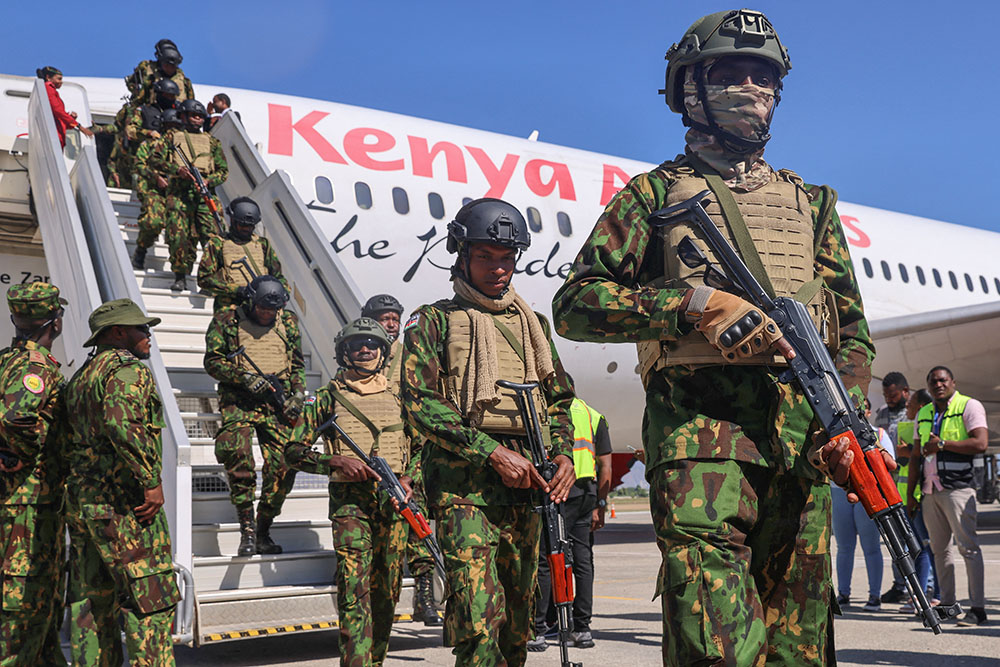
Kenyan police officers disembark from a plane while arriving as part of the Multinational Security Support Mission in Haiti, at the Toussaint Louverture International Airport in Port-au-Prince, Haiti, Jan. 18, 2025. (Reuters/Ralph Tedy Erol)
But the journey for the family — like all families in Haiti — remains clouded by the mounting uncertainty. Which is why the educator believes that, for the immediate future, some kind of outside military intervention is necessary.
"We're not in peace here in Haiti," she said. "We need people who can fight against the gangsters."
The educator does not believe any high-level negotiations with gang leaders would be fruitful, and such negotiations would needlessly legitimize the gangs. "Negotiate for what?" she said.
"When you leave home every day," she said of the daily experiences of Haitians today, "you never know if you are going to come back."
All that Haitians want right now, she said, "is to be able to work, to send their kids to school, to feed themselves."
Haiti is not, she said, inherently "a gang country. Haiti is a country where we used to live in peace."
It is that memory and that promise that keep sisters like Desil committed to their respective ministries — even though, for the moment, the 32 sisters living in her congregation's one-story motherhouse are largely confined inside.
Desil said her congregation, despite great odds, is doing its best with few resources to keep ministries — like schools — continuing in the congregation's 31 mission sites in rural areas where gang activity is not yet as prominent as it is in the urban areas.
"We do what we can."

